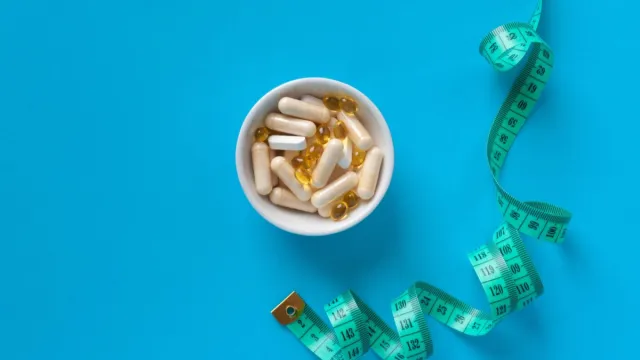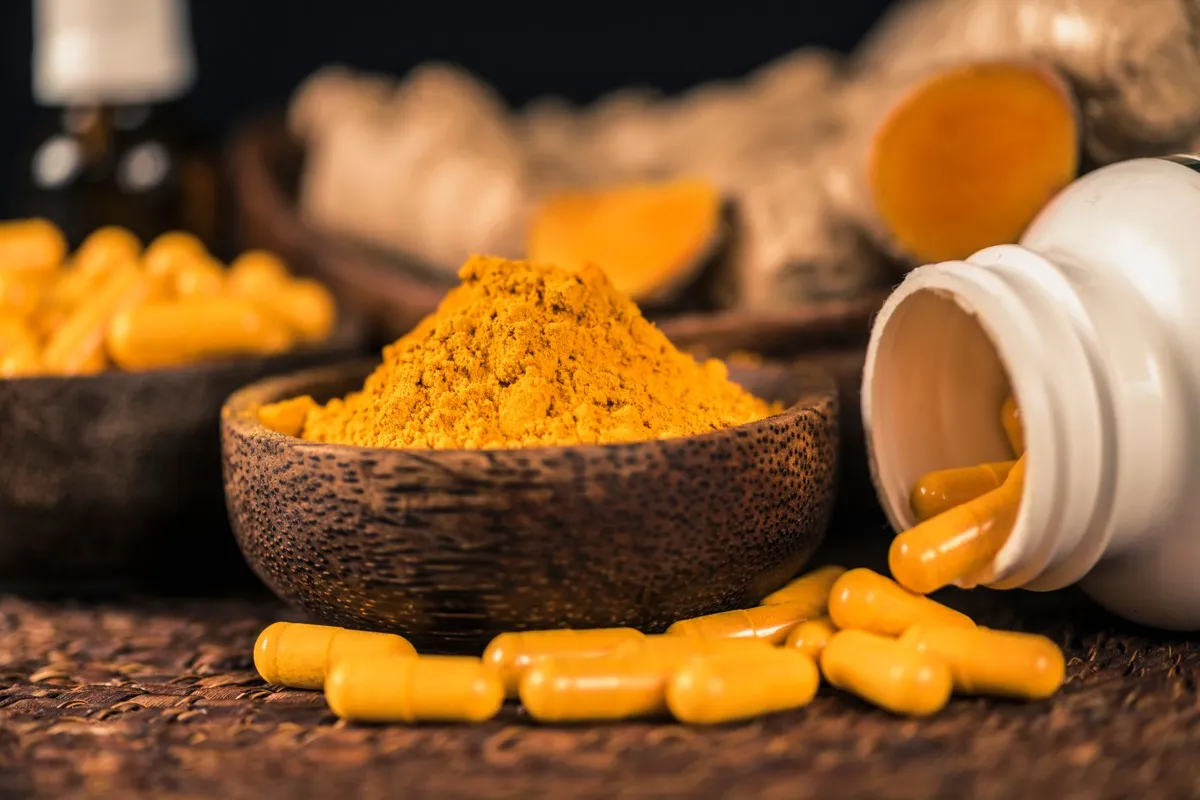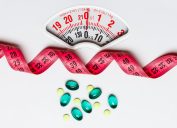7 Supplements to Avoid If You're on Weight-Loss Drugs, Doctors Say
These dangerous combinations could put you in harm's way.

Deciding to take weight-loss medication is no small commitment. Though the newest class of weight loss injections is known to be uniquely effective in helping people regulate blood sugar and shed excess pounds, they are also known to cause serious side effects in many patients. To make matters worse, taking weight-loss drugs alongside certain supplements can cause interactions or trigger more serious side effects. That's why, if you take medication to manage your weight or diabetes, it's important to communicate with your medical provider before you add any new medication or supplement to your regimen.
Though your doctor is a crucial partner in helping you avoid any potential interactions, experts say there are a handful of supplements that are widely known to cause problems and should be generally avoided. Some of these undermine the benefits of weight-loss drugs, while others heighten them to dangerous effects. These are the seven most common culprits behind unintended interactions.
RELATED: 12 Supplements You Should Never Take Together, Medical Experts Say.
1
St. John's Wort

Available as a tea, tablet supplement, and liquid tincture, St. John's Wort is commonly used to treat mild cases of depression. However, experts caution that it can cause side effects including dizziness, fatigue, photosensitivity, and more, and can interact with a wide range of other medications.
Phyllis Pobee, MD, an obesity medicine specialist, explains that St. John's Wort can cause unintended consequences when paired with weight-loss medications in particular.
"This supplement can reduce the effectiveness of many weight-loss drugs by increasing their metabolic rate through liver enzymes. This can lead to decreased drug levels and reduced efficacy," she says.
2
Green tea extract

Packed with polyphenols, many people swear by green tea extract for its ability to lower blood pressure, improve heart health, and aid in weight loss. In fact, some people intentionally combine this supplement with weight-loss drugs in an attempt to maximize the effects.
However, Raj Dasgupta, MD, an internal medicine specialist, pulmonologist, and Chief Medical Advisor for Sleep Advisor, says that you should exercise caution if you plan to take green tea extract alongside certain weight-loss drugs.
"With its caffeine content, green tea extract can interact with stimulant weight-loss drugs, causing side effects like jitteriness, sleep disturbances, and increased blood pressure," he tells Best Life.
Pobee adds that this goes for any supplement that contains caffeine: "While caffeine is commonly used to boost metabolism, high doses can cause or exacerbate anxiety, high blood pressure, and insomnia, especially when taken with stimulant-based weight-loss medications. It can intensify these side effects, leading to potential health risks."
RELATED: Doctor Says Ozempic Raises Certain Health Risks by Up to 900%.
3
Vitamin C

Vitamin C is among the most popular supplements on the market, often used to boost immune function and improve the health of bones, teeth, ligaments, blood vessels, and more.
However, Suzanne J. Ferree, MD, a doctor specializing in performance and longevity medicine, says it's best to avoid vitamin C while taking certain weight-loss peptides. She explains that vitamin C can aggravate reflux, which is a common side effect of this type of weight-loss medication.
4
Bitter orange

Bitter orange supplements are often used in weight-loss products for their stimulant effects, which are similar to those of the banned herbal supplement ephedra.
"When combined with prescription weight-loss drugs, particularly those that are stimulant-based, it can significantly increase the risk of cardiovascular side effects like hypertension and heart palpitations," warns Pobee.
RELATED: 5 Supplements That Can Damage Your Kidneys, Doctors Say.
5
Turmeric

In addition to fighting inflammation with its antioxidant properties, some people use turmeric supplements to aid in weight loss and digestion. However, Ferree advises against combining curcumin or turmeric supplements with weight-loss drugs.
She notes that like vitamin C, turmeric can exacerbate reflux. She adds that it can also inhibit the enzyme DPP4, which enhances the breakdown of GLP-1. "This has the theoretical potential to make weight-loss injections more potent or long-lasting, causing more side effects," she explains.
6
Charcoal and clay supplements

Charcoal and clay supplements are thought to reduce gas and bloating and help regulate digestion. Some people also take these supplements to bind with and remove toxins from the body, though there is scant research to support this claim.
Ferree says that if you're taking a weight-loss medication, you should probably avoid pairing it with these types of supplements. "Charcoal, clays or other detox binders…tend to be constipating and may aggravate the side effect of constipation," she tells Best Life.
RELATED: 7 Supplements That Can Help You Lose Weight, Doctors Say.
7
Butyrate

Butyrate is a short-chain amino fatty acid that's naturally produced by your body as it breaks down fiber in the digestive system. Though the best way to increase your natural butyrate levels is to eat fresh fruits and vegetables containing soluble, fermentable fiber, some people turn to supplements.
However, Ferree says that this can interact with weight-loss medications such as Ozempic or Wegovy, which are a class of drugs known as GLP-1 agonists.
"Butyrate either as sodium butyrate, tributyrin, or the ketone esters also work to raise GLP-1," Ferree explains. "While we have found these helpful to wean our patients off the weight-loss injections when they reach their weight-loss goals, we sometimes find it aggravates side effects of weight-loss medicines while on them."
Best Life offers the most up-to-date information from top experts, new research, and health agencies, but our content is not meant to be a substitute for professional guidance. When it comes to the medication you're taking or any other health questions you have, always consult your healthcare provider directly.





















